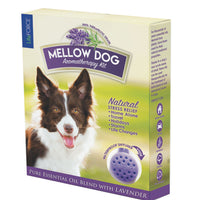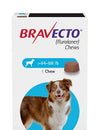Broccoli shows up cooked on our dinner plates, blended into our soup pots, and snuggled alongside party-tray dips so we can scoop with abandon while feeling good about it.
 Well, you may want to add it to your dog’s food bowl, as well. This member of the cabbage family has lots going for it: amino acids, vitamins, minerals and antioxidants—all of it packed inside those green heads and stems!
Well, you may want to add it to your dog’s food bowl, as well. This member of the cabbage family has lots going for it: amino acids, vitamins, minerals and antioxidants—all of it packed inside those green heads and stems!
Compounds found in broccoli modulate people’s and dogs’ immune system with antiviral, antibacterial and anti-cancer activity, according to Dr. Deva Khalsa, VMD, a holistic vet who is a consultant for American National Public Radio, among other media. Khalsa praises broccoli for containing a molecule called sulforaphane that boosts your dog’s protective cellular enzymes and flushes out cancer-causing toxins. And, she says, broccoli’s phytochemicals (organic compounds found in plants) significantly decrease the risk of cancer. As is the case with phytochemicals found in other whole foods, broccoli’s phtyochemicals work with our cells. And as canine cells behave the same way as ours do, these compounds can help prevent cancer in our dogs, too.
The opportunity for cancer disease starts when carcinogens damage and alter the DNA in cells. This alteration may lay quiet for years, until certain conditions advance the creation of a cancer cell. The tumor-suppressor gene p53 then goes to work, fighting to resist cancer. This gene monitors the biochemical signals in cells that indicate a DNA mutation is developing. Gene p53 creates proteins that instruct the cell to either halt, or self-destruct. Research proves that nutritional support with phytochemicals from broccoli help prevent a cell from progressing into a malignant growth. Certain phytochemicals help cells slough off carcinogens and toxins quickly, so the chance for permanent DNA damage decreases. These are the super-hero phytochemicals; other phytochemicals sustain more general cell functions. Others still propel our immune system into gear.
When Hippocrates said “Let food be thy medicine,” did he anticipate his directive would be substantiated by 21st century science? Either way, I suspect the ancient Greek physician probably had a dog and also enjoyed a broccoli and dip party-tray, too.





















